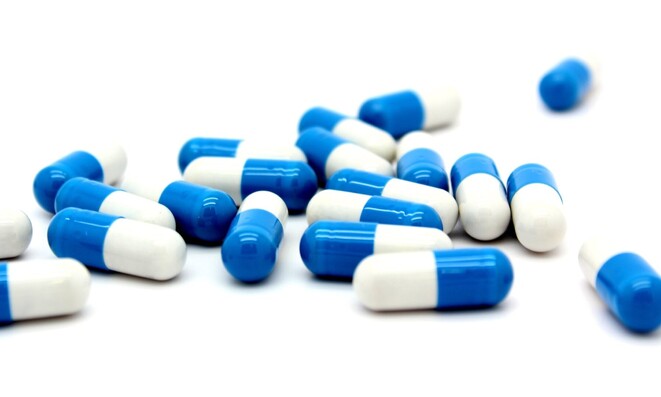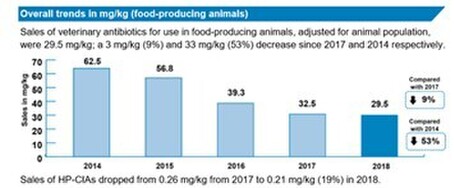Responsible antimicrobial use is not always straight forward and requires enhanced communication between farmers and vets as well as advisory support when navigating the challenge of change on farm.
As part of a knowledge exchange trip to New Zealand, I have been helping VetSouth with farmer and vet workshops to discuss animal health, wellbeing and reducing antimicrobial use. In the UK, we have reduced antimicrobial use (AMU) across the food producing sector year on year. There has been a 53% decrease in sales of antibiotics since 2014 and a 9% decrease since 2017 (see figure 1).
Total AMU now stands at 29.5mg/kg (Population Corrected Unit) for 2018. Note that in NZ, our total AMU is around 10-11mg/kg PCU. The decrease over recent years has largely been down to the co-ordinated effort of every food sector improving the way antimicrobials are used and focusing on improving animal health (e.g. sales of cattle vaccines have increased by 20% since 2011).
Figure 1 (UK data only)
Nevertheless, the amount of antibiotic sold across the food producing sector in the UK is still higher when compared with New Zealand. The total amount of antibiotic sold in the food producing sectors in New Zealand in 2017 was 70.5 tonnes compared to 248 tonnes for the same year in the UK.
The most recent sales surveillance report for New Zealand is only for 2017, however, and measuring AMU in total tonnes without a population at risk as the denominator is imprecise.
In dairy farming specifically, blanket AMU for dry cows is commonplace, which in the UK is now seen as less than optimal AMU.
Targeted use of dry cow antibiotic therapy is needed and has been a popular topic at the recent VetSouth workshops. This is something that VetSouth have been working towards for the past couple of years, in conjunction with teat seal use.
The participatory meetings have been part of an existing project called the Sustainable Health Groups project - co-ordinated by staff at VetSouth and funded by MPI - that has been using a farmer-led model to work out practical strategies to improve animal health and reduce reliance on antimicrobials.
Alongside staff at VetSouth, I planned and facilitated a series of workshops to recruit more farmers to the MPI’s Sustainable Farming Fund project. At these meetings we covered some of the following subjects;
- Avoiding Critically Important Antibiotics
- Weighing animals as opposed to guessing weights
- Internal teat sealant tube insertion technique, Mastitis detection, treatment and prevention
- Use of anti-inflammatories
Farmers were asked to talk through their drying off protocol as a group and were able to hear how everyone dried off cows slightly differently; they were not as hygienic as they could be! I challenged farmers to estimate weights of cattle whilst on a farm walk and compared their responses to weight data for the host farm. Everyone underestimated by ~100kg, which resulted in discussion about under dosing antibiotics and how this contributes to AMR developing.
By allowing groups of farmers to share their practices with each other, they were able to learn how other people did similar tasks and were able to reflect on their own practices. This peer-to-peer support has been shown to help change practice on farm and works well when there are multiple factors influencing decision making around animal health.
The next stage of the Sustainable Health Groups project is recruiting more farmers to new groups that aim to improve animal health and reduce the need for antimicrobials.
If interested contact Debra McCorkindale on 021 062 6556.
- Lisa Morgan


